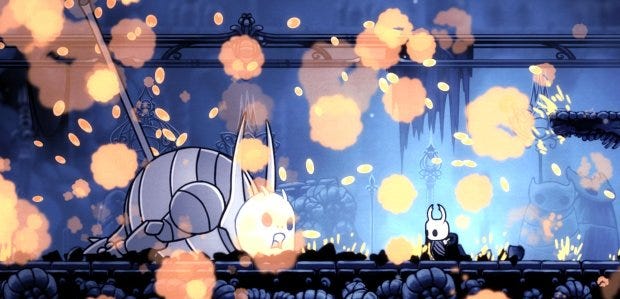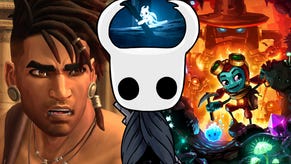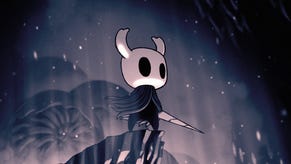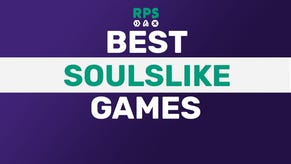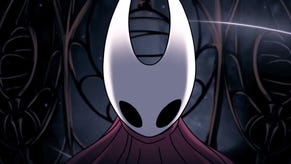Hollow Knight feels too familiar, despite being a solid metroidvania
Rings a little
Hollow Knight [official site] presents a peculiar issue. What do you do with a game that is genuinely good, but rather unoriginal? A game that is so, so similar to others that have come recently before it, but is still a beautifully drawn, solidly built metroidvania? Do you say, "Get this one, because it's the most recent?" That's not a coherent argument. Unfortunately for Hollow Knight, I think the design decisions that narrowly define it are really its core weaknesses.
I love these sorts of games. I can wile away many hours jumping around their labyrinthine caves, eeking out new abilities to reach new areas, incrementally improving my health, jump, attacks and skills so that what was once a challenge becomes a corridor on the way to the new challenge. It's a wonderful model, and it's been done wonderfully many times before. So Hollow's choices to make what are stalwarts of the genre into its most frustrating features is a disappointing decision. I have played for a good few hours, but am only a fraction of the way into the game. Keep that in mind as you read.
We're not short of competition. This year has already offered us the utterly splendid Alwa's Awakening, then just a few months back we had the triumphant release of Owlboy. 2016 also saw the competent (but extraordinarily familiar) Song Of The Deep, and the sublime Ori & The Blind Forest's definitive edition. Then there's Aquaria, Axiom Verge, Environmental Station Alpha, The Swapper, VVVVVV, Cave Story+, Guacamelee, and the dozen others you're annoyed I've not listed. And of that list, most problematic for Hollow Knight is Ori & The Blind Forest.
The two games have a great deal in common, but Ori is just better in every element. And sure, that's an awkward critical path ("this game isn't as good as the best example of this genre"), but it starts to become a more imposing issue when the game in question appears to bring nothing new to the table.
In Hollow Knight, you play a bug-like creature exploring (wait for this) a formerly rich and vibrant underground world that is now grey and ruined. Goodness me, how did they think of this?! At the start you're limited to a melee attack and a basic jump, and as you progress through its caves you gain new skills and buy others from a growing number of above-ground merchants. Out of reach areas become in reach when you gain, say, a dash move, which leads you to new zones and their fresh crop of currently impassable obstacles. It is, to put it more briefly, a stock metroidvania.
From this foundation most games listed a couple of paragraphs above bring their own new details. Owlboy has your character able to carry another in his talons, bringing in their unique abilities as you fly through its world. The Swapper has its key mechanic to make it stand out. Ori has a tale of deep emotion, breathtaking art and... well, here's the rub. Ori is actually not especially original - it just messed things up for those that come after it by taking the core foundations and delivering them with something close to perfection. So when Hollow Knight steps onto the battlefield with no unique weapon of its own, Ori just squishes it.
I began by alluding to its weaknesses and perhaps now I name them you'll take umbrage. Hollow Knight takes core features of the genre and then tries to tell you they're special. Like, perhaps at its most egregious, your position on a map. Maps are tricky enough here, with new zones not possible to even map as you explore them - you have to buy or find a pre-created map to even bring up the map screen for an area, and then fill in the dotted lines of where you've yet to explore. Quite why your character can't know that they just walked down a path and went left I'm not sure, but that's how it is. You can spend long stretches aimlessly stumbling around until you find your way out. But on top of this, to see where your character is on a map when you have one is considered a feature, a special ability gained by purchasing it from a shop and then using one of your precious ability slots to implement it. A basic standard of the genre, locked up behind a purchase and a skill use. So, so weird.
So rather than enjoying a burgeoning pool of abilities, you're restricted to however many ability slots you have, and choosing between them. I'd love to use the skill I paid a small fortune for that makes drops magnetically attracted toward me, but I really can't live without the extra soul gathering from attacked enemies (used for both healing and crucial ranged attacks), and knowing where the hell I am on the near-identical monochrome section of a level at any point. Any other game in the genre lets me have all three without a fuss, and doesn't even consider one of them a special feature.
My other big issue here is again something that might have you cry, "At last! What I've always wanted!", and all power to you. The game feels way too loose and sprawling to me. With a real lack of direction about why you're there, what you're trying to achieve, and why you should want to go anywhere beyond 'because it's there', the openness of the multiple zones ends up leaving me feeling agoraphobic rather than freed. You know that eventually you'll hit an ability wall, perhaps a chimney of rock with alternating spikes on either side, and you'll think, "Oh, I'm going to be able to bounce off walls at some point then," but there's no notion of how, or where, or when, or why. There are so many dead ends to go in at once! I'm left wishing for some allusion toward direction, or at least a more meaningful motivation for such rambling.
All this said, it delivers on what it delivers. The movement is fast but sturdy, the combat nifty, and the artwork is really lovely. Its choice of greys and muted greens and blues doesn't do it enormous favours, and each area is pretty monotone. Animations are great, and the world is pleasingly detailed, but it also feels flat and dulled. Again, the comparison with Ori is a heavy blow, and if you were choosing between the two it'd be another strike against.
But perhaps you're not. Perhaps you just want to plough through another metroidvania (if only we had a better name than that), and then this is a fine game for you. It ticks most of the boxes, completely with difficulty spike bosses that make me want to carve my hate for the experience in the sides of mountains, but apparently people love those. It's a pretty, competent, if needlessly frustrated standard of the standard. That might be just what you need.
If you're looking for something like this, then get yourself Ori & The Blind Forest, which is truly tremendous.
Hollow Knight is out now on Windows for £11/$15/€15 via Steam, Humble and GOG.
